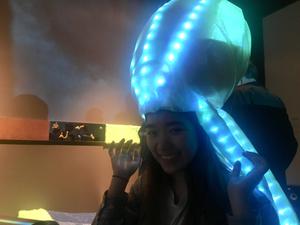Splash Biography
ZOE LEE, Neuroscientist and Philosopher in Training
|
Major: Psychology College/Employer: UCLA Year of Graduation: G |

|
Brief Biographical Sketch:
Zoe is a neuroscientist and philosopher in training, investigating the human (and other) minds. Driven by her love for cognitive science and its interdisciplinary nature, she continues her intellectual adventures by approaching everyday phenomena in light of the mysteries of mind and brain. She founded The Quale [kwah-lee], an organization at UCLA that brings together not only neuroscience and psychology but also other fields including philosophy, art, literature, economics, and film to unravel the secrets of the mind such as perception, memory, and emotions. Her research interests are as wide as they can be, but to mention a few: mental imagery, neuroimaging and modulation techniques, and of course, consciousness. Past Classes(Clicking a class title will bring you to the course's section of the corresponding course catalog)S160: Mind-Reading and Mind-Control: How to measure and manipulate your brain in Splash Winter 2020 (Feb. 01, 2020)
As science and technology advances at an incredible rate, it seems that we are getting closer to the realization of sci-fi mind-reading and mind-control. But how close are we, really?
In the first hour, we will discuss various neuroimaging methods of how scientists measure the brain's activities, such as MRI (magnetic resonance imaging), fMRI (functional magnetic resonance imaging), EEG (electroencephalography), and the physics behind their mechanism. We will try reading someone's brain activities in real time, using EEG. (You can volunteer if you are ok with getting some goo on your hair/scalp! Not harmful, comes off with a wash.)
In the second hour, we will discuss some non-invasive neurostimulation techniques (ones that don't require making a hole in your skull) for manipulating the brain's activities, such as TMS (transcranial magnetic stimulation) and LIFUP (low-intensity focused ultrasound pulsation), and the physics behind their mechanism.
S93: The "High" Brain: Psychedelic (and other) Drugs in the Brain in Splash Spring 2019 (Apr. 20, 2019)
It's 420- so let's talk about drugs. We will go on a scientific investigation of psychedelic drugs--including marijuana, shrooms, ecstasy--as well as some other addictive drugs such as coffee, tobacco, and alcohol. How do they cause the "high", and how do they affect our brain, short-term and long-term?
*Disclaimer: The purpose of this class is to pursue a neuroscientific take on drugs that are commonly discussed and/or used in our community. The teacher or the program does not advocate or promote the use of any illegal or potentially harmful drugs!
S63: Looking through the Lens of the Mind's Eye: The Science of Imagination in Splash Winter 2018 (Feb. 10, 2018)
Imagine- a sunset; the Star Wars theme song; the smell of roasted chicken; the texture of fresh tomato on your tongue. Did you feel like you ‘saw’ a sunset before your eyes? ‘Heard’ the melody of the Star Wars theme song, and ‘smelled’ roasted chicken? Better yet, are you hearing a voice reading these words?
Though your ability to create these inner images or voices may feel obvious to you, everyone's mind's eye is exhibited on a very wide spectrum: from people who thought “counting sheep” was just a metaphoric phrase or had never had “a song stuck in their head,” to those who see colors while reading letters or listening to music.
In this course, we will explore the scientific and philosophical realms of your mind's eye (and ears, nose, tongue, and fingers) through some curious cases at the extreme ends of the spectrum, and discuss what they teach us about the mind's I (our consciousness).
|
|
